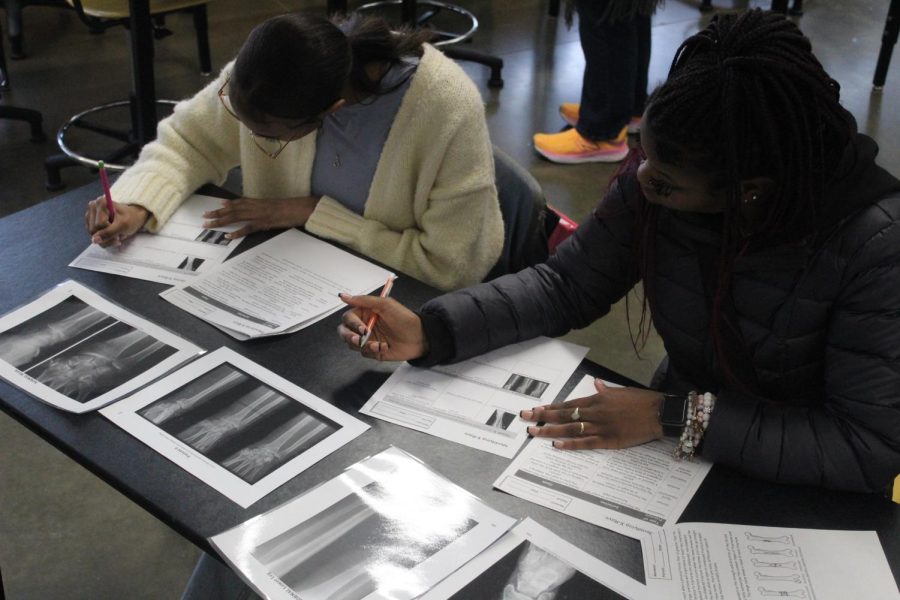Navigating the first two years of high school
High School can offer a lot of interesting opportunities, but also a lot of challenges. Coming up with a plan that best suits your strengths will set you up for success.
March 10, 2023
When transitioning from middle to high school, an array of things, from new found freedom to an unhealthy amount of stress can affect the future of students in ways they might not realize. It’s important to stay on top of things, and in order to do that, you need to know the weight of every action you take for your first two years. It may sound intimidating, but Ms. Chandra Jones and other students enrolled at Central High can help break down a few things that Freshman and Sophomores can take into consideration in order to to set themselves up for success.
Ms. Jones is a Gifted Education Facilitator here at Hazelwood Central High who dedicates her time to helping students with any problems they might encounter in their four years of high school. She studied at both Harris Stowe and Lindenwood University, where she then got her masters degree in Gifted Education. She has been working with students at Central for four years now, guiding them through the transition from middle school to high school, then high school on to post-secondary education.
Having over one hundred freshman through senior students in the Gifted Education program, Ms. Jones has close connections with the majority of them, aiding them in any way she can. Jones believes that when creating a schedule, students often forget to properly consider their strengths and weaknesses, and suggests that one tip is for students to craft their schedule around their personal peak performance hours of the day.
“If you know that you struggle with math, then that’s not the class you want at the end of the day after you’re tired…after you have lunch and all your energy is depleted,” she said. “You have to be realistic in knowing your strengths and weaknesses in order to be most effective.”
When it comes to protecting your GPA, Jones doesn’t recommend shying away from honors and AP classes totally, instead suggesting that you challenge yourself in appropriate amounts. To receive good results, students have to put forth some level of initiative that they may not have been required to in the past.
“Introduce yourself to the teacher. Get a feel for their teaching style, and see if it’s compatible with your learning style.” she says. Ms. Jones proposes that students properly explore these advanced classes before deciding against it, as there is always a chance you’ll grow from the experience.
According to Ms. Jones, freshman and sophomore year are extremely important to your high school career, as they’re foundational. They are the years where students are being introduced to things that might interest them, meeting new people, and learning high school etiquette and good study habits.
“It helps shape what type of student you are ultimately going to be,” she said.
Stress management is another big factor in maximizing potential. There should always be a balance, making sure you don’t burnout while also picking classes that benefit you.
“Students should research stress coping mechanisms. There are different techniques that you can build into your daily lifestyle to help manage stress and anxiety. Reading, taking up hobbies, meditation… You have to find what works best for you,” she explained.
Many freshmen and sophomores don’t know what they want to do for the rest of their lives, and this can be helped by exploring classes that interest you. Central offers an array of classes that not only fulfill credit requirements, but also dabble in many topics and career paths.
LeBron, a junior currently enrolled in Hazelwood Central as well, can vouch for this. He believes that the key to a successful Freshman and Sophomore year lies within a student learning their limits, and finding things about school that makes doing well, worth it.
“A club or class can really change the trajectory of your whole day,” LeBron responded when asked about how he dealt with heavy workloads. “I used to come to school upset and not ready to work but eventually I found things that could pick me up throughout the day and help me push through. That’s all that really matters, pushing through.”
The best for some may not be the best for all, and students often forget that when exposed to so much pressure. Finding out what your best is, and then achieving that is a big enough accomplishment when transitioning over into high school, let alone exceeding it.
“If a B minus is the best grade you’ve gotten so far, strive for that B plus, or A, but don’t be discouraged if you simply get B minus again. Progress is a process, and you aren’t going to get it right the first time,” he said.
Freshman and Sophmores have lots of knowledge to gain when coming into high school, and will be taking in multitudes of new information. When overwhelmed, just remember to really consider your strengths and weaknesses, know yourself and what you can do, trust in your wellbeing, and give yourself the care you need when you are feeling undone. Make sure to get a feel for as much as you can! Lastly, students should simply remember that school is meant for learning, not only academically, but worldly. A failure in high school shouldn’t be seen as such; rather as a learning experience for you, and an opportunity to grow.
